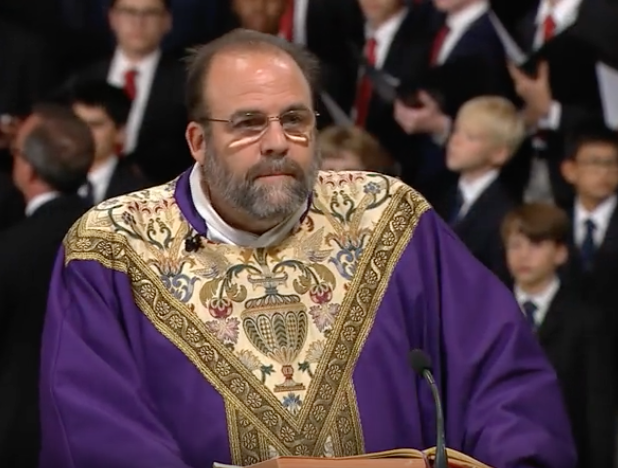Fr. Raymond J. de Souza: Humanae Vitae Dissent Is Alive and Well in the 21st Century

Fiddling While America – and Rome – Burn?
July 26, 2018
“Solidarity HealthShare ” Organization to Pay for Natural Fertility Care and Sterilization Reversals
July 26, 2018
By Father Raymond J. de Souza, National Catholic Register, 7/25/18
The widespread theological and pastoral dissent that greeted the publication of Humanae Vitae 50 years ago has been a dominant force in Catholic life ever since. The reverberations continue to this day, with recent initiatives breathing life into the errors that St. John Paul II labored long and hard to correct.
By the summer of 1968, the world had already embraced contraception as a positive social development, the Protestant world had made its peace with it, and many Catholics — from couples in the pew to cardinals — expected that Pope Paul VI would accommodate himself to the sexual revolution, the sine qua non of which was easy contraception.
So when Blessed — soon-to-be saint — Paul VI taught that what had been traditionally taught as true remained true, it was, quite simply, an outrage. The dissent was early, organized and formidable.
Within days of the encyclical’s publication, Father Charles Curran, then a professor at The Catholic University of America, organized a news conference in Washington, where 77 theologians announced that the Holy Father was wrong.
“We conclude that spouses may responsibly decide according to their conscience that artificial contraception in some circumstances is permissible and indeed necessary to preserve and foster the values and sacredness of marriage,” Curran and his colleagues declared.
It was not possible for theologians to deny that the immorality of contraception was settled Catholic teaching. Pope Pius XI had made that abundantly clear in 1930, writing after the Anglican Communion had departed from the ancient Christian consensus that same year. Nor was it possible to argue that modern circumstances made it impossible to abide by the moral law. Pius XI had dealt with that, too, in Casti Connubii (Christian Marriage).
“No difficulty can arise that justifies the putting aside of the law of God, which forbids all acts intrinsically evil,” Pius XI wrote. “There is no possible circumstance in which husband and wife cannot, strengthened by the grace of God, fulfill faithfully their duties and preserve in wedlock their chastity unspotted. This truth of Christian faith is expressed by the teaching of the Council of Trent” (61).
The settled teaching was clear, and Paul VI had not departed from it. The best way, therefore, for dissenting voices to get around that teaching was by appealing, erroneously, to another principle: conscience. Conscience could determine, Father Curran and others argued, that the general moral principle did not apply in this particular circumstance.
The “others” were legion, including many of the brightest theological lights of that generation.
While most bishops and national episcopal conferences supported Paul VI in 1968 — notable, for example, were the bishops of Ireland, Scotland, Poland, Spain and the Philippines — there were also significant discordant notes sounded. For example, the Canadian bishops issued a response that followed the argument of Father Curran in an appeal to conscience over moral principle.
“In accord with the accepted principles of moral theology, if these persons have tried sincerely but without success to pursue a line of conduct in keeping with the given directives, they may be safely assured that, whoever honestly chooses that course which seems right to him does so in good conscience,” wrote the bishops, gathered in plenary assembly in Winnipeg.
Five years later, the Canadian bishops attempted to correct their faulty teaching, issuing a document on the “formation of conscience” that clarified that “the teaching of the magisterium … cannot be just one element among others in the formation of conscience. It is the definitive cornerstone upon which the whole edifice of conscientious judgment must be built.”
The task of reclaiming a proper understanding of conscience and correcting the damage done by dissent was enormous, beyond the capacity of Pope Paul VI alone. He would die 10 years after Humanae Vitae, having never written another encyclical. On the feast of Sts. Peter and Paul, six weeks before his death Aug. 6, 1978, he defiantly preached that, despite massive opposition: “I have kept the faith!”
Pope John Paul II, elected in October 1978 after the 33-day papacy of Pope John Paul I, would take up that task.
In 1981, in Familiaris Consortio (The Role of the Christian Family in the Modern World), he spoke of Humanae Vitae as a “prophetic proclamation” and made a “pressing invitation to theologians” to develop the “biblical foundations, the ethical grounds and the personalistic reasons behind this doctrine.”
To that end, John Paul II himself undertook the immense project of the “theology of the body” to provide the deeper foundation that Humanae Vitae lacked. For several years, the weekly general audiences were devoted to the question of God’s plan for sexuality and marriage, presenting it in a much richer way than the teaching of Paul VI.
As for the invitation to theologians, it went unheeded by the generation of 1968, many of whom continued to argue that conscience permitted dissent. Matters came to a head in 1988.
Twenty years after Humanae Vitae, the appointment of the conservative Cardinal Joachim Meisner to Cologne, Germany, in December 1988 brought forth a ferocious response from the European theological establishment. Within a month, 163 theologians from Germany, Austria, Switzerland and the Netherlands issued the “Cologne Declaration.” It lamented in a general way the pontificate of John Paul II, and in particular challenged his defense of the teaching of Humanae Vitae. In an echo of the organized dissent of 1968, many of the leading theologians of the Church restated that the teaching of Humanae Vitae was wrong and that Catholics in good conscience could disregard it.
Eventually, 130 theologians from France, 23 from Spain, 52 from Belgium and 63 from Italy also signed the statement. Two decades had passed — 10 under Paul VI and 10 under John Paul II — and the tide of dissent had not yet receded.
The importance of the Cologne Declaration 30 years ago was reflected earlier this year when Pope Emeritus Benedict XVI refused to endorse a series of books on the theology of Pope Francis, expressing his dismay that one of the authors had signed the Cologne Declaration and was the leader of “anti-papal” initiatives, including against Veritatis Splendor (The Splendor of Truth). The clumsy attempt by Msgr. Dario Viganò to conceal Benedict’s displeasure with the series by presenting to the media doctored photos and false claims led to his resignation as the prefect of the then-Secretariat for Communication.
By the time of the Cologne Declaration, John Paul II had decided, together with Cardinal Joseph Ratzinger, that the substantial and sustained dissent over Humanae Vitae required a comprehensive treatment of Catholic morality in its entirety, with particular attention to conscience. Veritatis Splendor was the result, an encyclical six years in the drafting. Together with Familiaris Consortio (1981) and the “Letter to Families” (1994), Veritatis Splendor — issued 25 years after Humanae Vitae — constituted a generational response to the upheavals of 1968. At the heart of Veritatis Splendor was that conscience is a witness to moral truth, not an independent interpreter of it.
But old errors — let alone recent ones — never fully disappear. The teaching on conscience by Pope Francis in Amoris Laetitia has been interpreted by some to echo the teaching of Father Curran in 1968, or the Canadian bishops that same year.
“Yet conscience can do more than recognize that a given situation does not correspond objectively to the overall demands of the Gospel,” writes the Holy Father (Amoris Laetitia, 303). “It can also recognize with sincerity and honesty what for now is the most generous response which can be given to God and come to see with a certain moral security that it is what God himself is asking amid the concrete complexity of one’s limits, while yet not fully the objective ideal.”
Some — for example, the bishops of Malta — have taken that to mean that divorce and civil remarriage can be judged in conscience to no longer be sinful.
Pope Francis, for his part, has not said that, and in other places, he has spoken favorably of Humanae Vitae.
But 50 years later, the issues continue to remain in dramatic tension in the life of the Church.
Father Raymond J. de Souza
is the editor in chief of Convivium magazine.
Copyright © 2018 EWTN News, Inc. All rights reserved.
http://www.ncregister.com/daily-news/humanae-vitae-dissent-is-alive-and-well-in-the-21st-century




